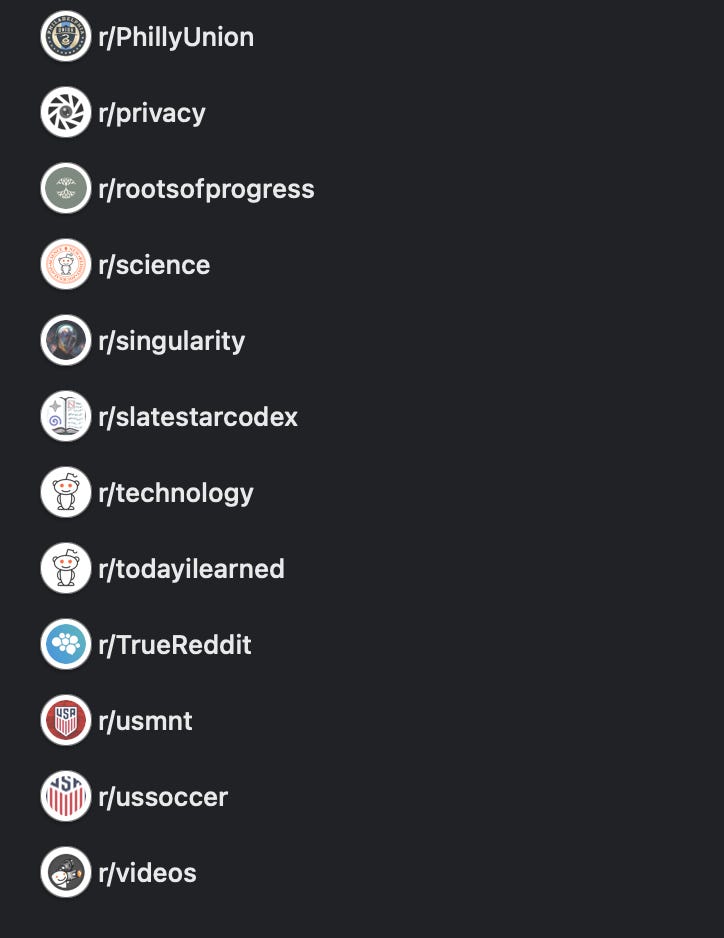One approach to a heavily curated information diet
Disclaimer: This approach works for me. It may not work for you, but also maybe gives you some ideas.
I find the signal to noise ratio on social media and news sites/apps too low for me to have a consistently good experience on them. So, I developed an alternative, heavily curated approach to an information diet that I’m laying out here in hope people will give me suggesions over time to improve it.
It involves four main inputs:
RSS, skewed towards “most upvoted” feeds
I use Reeder because it has a polished user interface, formats the feed in an aggregated, chronological timeline across devices, and has native reddit and filtering support, but there are many other RSS readers too.
I subscribe to around 25 feeds and 25 subreddits through Reeder. To increase the signal to noise, I try to find “most upvoted” feeds where possible. For example, for subreddits, I usually use the top posts for the week, which you can get for any subreddit like this: https://www.reddit.com/r/economics/top.rss?t=week (just replace ‘economics’ with the subreddit of your choice). Doing so will get you on the order of five top posts per day, but you can also change ‘week’ to ‘day’ to increase that number to about twenty or to ‘month’ to decrease it to about one, which I do for some feeds. To find generally interesting subreddits I looked through the top few hundred subreddits, and then I also added some niche subreddits for specific interests I have.
Below is part of my reddit list (alphabetical). You can see I have some really large subreddits (technology, science, todayilearned) mixed in with more niche ones (singularity, truereddit), as well as communities (rootsofprogress, slatestarcodex) and hobbies (phillyunion, usmnt). Getting about twenty five across a range of your interests makes a good base feed.
Many publications still have RSS feeds if you search for publication name+RSS. If they don’t, it’s likely RSS.app or Feedspot has made one you can use instead. There is usually support through one of these methods for sub-section publication feeds, for example the tech section.
Here are some other examples of non-reddit “most upvoted” feeds that might be more widely appealing:
Hacker News RSS - for example, I added the 300 and 600 points feeds, meaning you get notified when a story hits 300 or 600 points (you can pick any number).
NYT RSS - they have most emailed/shared/viewed
Techmeme RSS - curated by the techmeme team
LessWrong RSS - they have a curated feed
Then I also just consume the main RSS feeds of some really high signal publications like Ars Technica (full articles come through for subscribers), The Information, Quanta, etc.
Even with all this curation, the signal to noise for me isn’t that great. I skim through the timeline mostly, but I do end up getting a bunch of interesting articles this way every day. I do use the filtering feature of Reeder to drop out some really low hit keywords.
Podcasts
I subscribe to about 20 podcasts via Overcast. I like the Overcast “Voice Boost (clear, consistent volume)” and “Smart Speed (shorter silences)” features as well as the ability to do a custom playback speed for each podcast.
The signal to noise ratio is better here than the RSS feeds, but I still don’t listen to every episode, and for ones I do I often skip around. I like having a queue to listen to in the car and at the gym.
I find new podcast discovery pretty hard. I’ve looked through the Overcast top podcasts lists in all the different categories, and tried lots of them, but not many stick for me.
Email newsletters
I subscribe to about the same amount (20-25) of email newsletters, some daily but most weekly or less. Signal/noise is less than podcasts, but greater than the RSS feeds. I’d guess my hit rate is about 20% in terms of reading them through vs. maybe 50% for podcasts listening through and 5% for the full RSS amalgamation reading through.
About half of the email newsletters I subscribe to are through Substack and half are direct from websites/organizations.
People sending me links
I really appreciate when people send me curated links, which happens less than I’d like but I can’t complain because the signal to noise here is the highest with a hit ratio maybe 80%. I try to encourage it by saying thank you and responding when I have thoughts.
With those four inputs, I feel decently covered, but sometimes I do wonder what I’m missing out on and occasionally relapse back to going directly to a news or social media app and skimming the front page. This method of course depends on having a good list of feeds, podcasts, and newsletters. But in general, I’m personally happier with this approach, though of course your mileage my vary. If you’re doing something similar and have any ideas on process tweaks or specific recommendations for feeds, podcasts, or newsletters, I’d love to hear them.



As I don't have time to be more articulate, this is freaking brilliant. Thank you!
Thanks for sharing Reddit feed trick. I would recommend you to checkout this *daily* Hacker News feed : https://hackernewsrss.com/